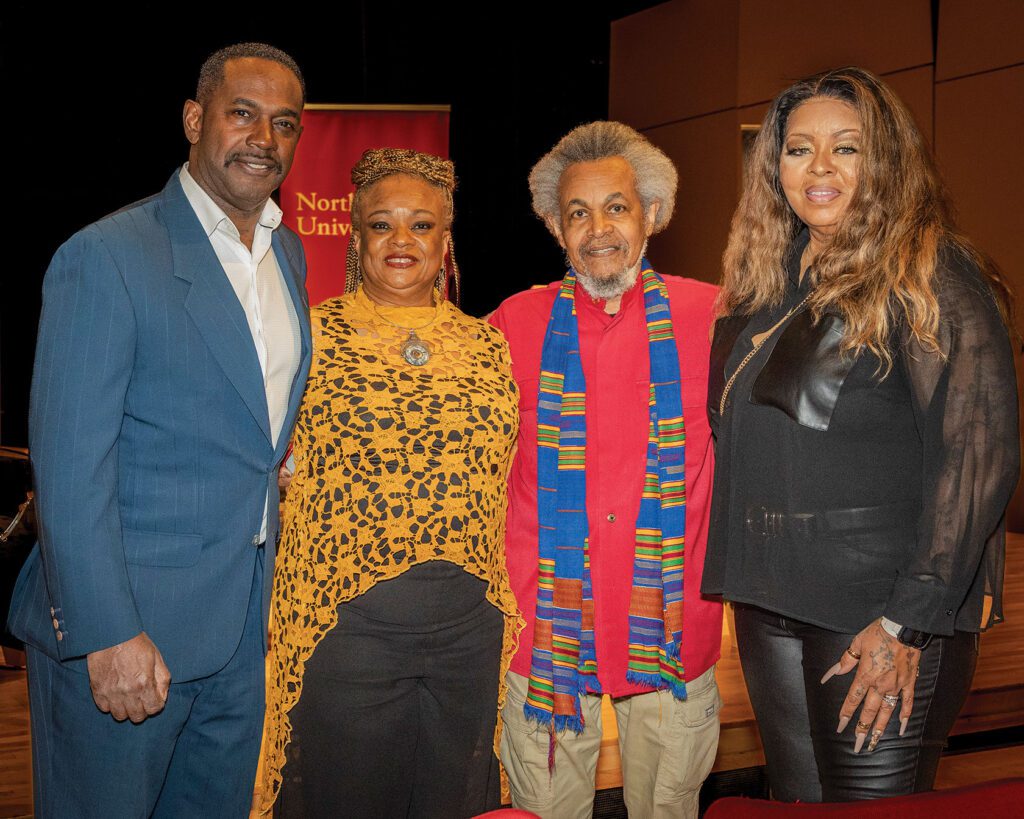
Modern hip-hop has become so “grotesque” that Timothy “Mr.Goodbarz” Thorpe, a Massachusetts-based hip-hop musician, said he coined the term “Bringing out Playfulness” as a solution to combat the negative trajectory he feels is taking root in the genre.
“It encourages artists to create motivational and uplifting music, and (it leverages) the power of modern music models for positive change,” he said of BOP. “The current music landscape of today often focuses on materialism, love, and partying; it has a lack of positivity.”
Thorpe made his remarks during the 17th Annual Black New England Conference last month, themed “I, Too, Sing: Art, Music and Writing in our BIPOC Communities.”
The event, held at Northeastern University, was presented by the Black Heritage Trail of New Hampshire, which promotes awareness and appreciation of New Hampshire’s African American history and life, in partnership with Northeastern and the Reckonings Project. The focus this year was bringing together people of color who are artists, musicians and scholars to explore the musical aspects of their culture, hip-hop’s impact on the region and other key issues, including the fate of modern hip-hop music.
The discussion comes as hip-hop celebrates its 50th year, and it also waded into complex topics including cultural appropriation vs. cultural appreciation, solutions to hip-hop and academia’s response to the genre.
“We have the entire continuum of Black music going all the way back to gospel, blues, jazz … until all of these musical forms, plus music in the Black diaspora, converge by all these people who are in New York and all these influences made what we call rap music now,” said Dart Adams, hip-hop historian, journalist and moderator of one of the panels on Saturday.
That panel included Thorpe along with Lai Frances, an entertainment journalist, and Frank Waln, a musician and member of the Lakota Nation.
“Hip-hop is like a powwow,” said Waln, a Sicangu Lakota rapper. “It’s a beautiful culture that was created out of our colonization (and) out of our genocide.”
He said hip-hop added space for artists to “come together as relatives and see where we’re similar and see where we relate to each other outside of whiteness.”
Frances, who is Filipina, said she has witnessed the influence that Black culture has had on the rising success of K-Pop, short for Korean popular music, which is one of the most popular music markets today. She also acknowledged an issue that has arisen from such an impact, such as discerning cultural appropriation versus appreciation.
“Many songs contain soul, R&B, rap, hip-hop, rock, and also trap,” Frances said. “Big names have been held accountable and called out by their communities for their past appearances in music videos and performances, where they can be seen wearing box braids, durags, cornrows, or even cultural symbols from Native Americans.”
Adams said he yearns for more “academic based” discussions surrounding hip-hop music, adding that hip-hop was much more embraced this year than previously.
“There’s a lot that needs to be done to make people understand the intricacies of rap or hip-hop. There’s a lot to unpack here (on how to teach the art form),” he said.
The auditorium was filled with a wide variety of people who came out for myriad reasons.
“I came to the Black New England Conference last year, where the topic was where the money resides, and learned so much that I really wanted to come for a second year,” said Suzanne Scharff, a student at the University of New Hampshire, who drove all the way from her school just to attend the event.
Kwe Pierre Tchetgen, an assistant professor with a joint appointment in music and art and design at Northeastern, brought students and took away some lessons.
“I’ve been very interested in learning more about the Black experience in New England,” Tchetgen said.
The conference also featured keynote addresses and special guest presentations by Silvermoon LaRose, McKinley Wallace III, Theo Wilson, playwright Kirsten Greenidge and house music superstar Robin S.
Bay State Banner Publisher Ronald Mitchell, in his welcome remarks, spoke about Boston’s Black history and its leaders who have always had national and international influence, from early free Black communities of Beacon Hill to early civil-rights leaders like W.E.B. Du Bois and William Monroe Trotter to the current crop of local leaders. Mitchell also conducted a Q&A with Robin S, in which the Queens, New York native discussed her career and her early musical start in the church. Robin S. is currently getting ready for the 30th anniversary “Show Me Love” tour across America and Europe.
Roxbury artist Napoleon Jones-Henderson received the Black Heritage Trail of New Hampshire’s 2023 Citizen of the Year Award. Previous recipients have included Jay Williams, president of the Hartford Foundation, sculptor Fern Cunningham Terry, artist and writer Ashley Bryan and Melvin B. Miller, founder and longtime publisher of the Banner.
Jones-Henderson was honored for his decades of commitment to promoting the arts in the Black community and his “relentless devotion to uplift and inspire communities, advocate for the greater good and mentor a new generation of artists.”






